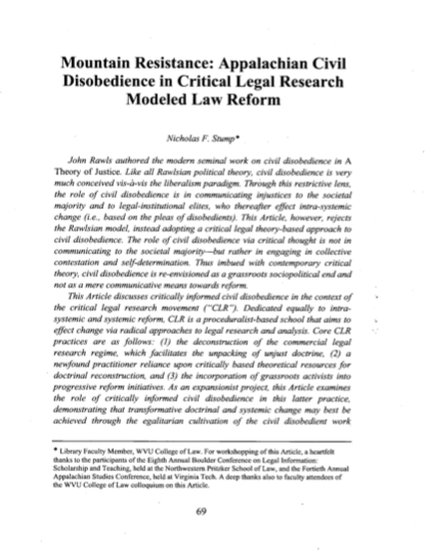
Article
Mountain Resistance: Appalachian Civil Disobedience in Critical Legal Research Modeled Law Reform
Environs: Environmental Law and Policy Journal
(2017)
Abstract
John Rawls authored the modern seminal work on civil disobedience in A Theory of Justice. Like all Rawlsian political theory, civil disobedience is very much conceived vis-a-vis the liberalism paradigm. Through this restrictive lens, the role of civil disobedience is in communicating injustices to the societal majority and to legal-institutional elites, who thereafter effect intra-systemic change (i.e., based on the pleas of disobedients). This Article, however, rejects the Rawlsian model, instead adopting a critical legal theory-based approach to civil disobedience. The role of civil disobedience via critical thought is not in communicating to the societal majority -- but rather in engaging in collective contestation and self-determination. Thus imbued with contemporary critical theory, civil disobedience is re-envisioned as a grassroots sociopolitical end and not as a mere communicative means towards reform.
This Article discusses critically informed civil disobedience in the context of the critical legal research movement ("CLR'). Dedicated equally to intra-systemic and systemic reform, CLR is a proceduralist-based school that aims to effect change via radical approaches to legal research and analysis. Core CLR practices are as follows: (1) the deconstruction of the commercial legal research regime, which facilitates the unpacking of unjust doctrine, (2) a newfound practitioner reliance upon critically based theoretical resources for doctrinal reconstruction, and (3) the incorporation of grassroots activists into progressive reform initiatives. As an expansionist project, this Article examines the role of critically informed civil disobedience in this latter practice, demonstrating that transformative doctrinal and systemic change may best be achieved through the egalitarian cultivation of the civil disobedient work product. Civil disobedients -- in addition to reformist-minded attorneys, theoreticians, and other grassroots activists -- occupy a privileged reform space in this novel framework.
In linking theory to concrete reality, Appalachian civil disobedience practices are utilized as the case model for this Article. Civil disobedience is often the sole contestatory means available to the structurally subordinated Appalachian citizenry, which has suffered interminably at the hands of extractive industries and the captured ruling elite. Mountaintop removal mining, a singularly destructive practice, has long been contested by both disobedients and legal-institutional reformers; recently, momentous mountaintop removal change has at last occurred. This Article demonstrates that by incorporating Appalachian civil disobedients into continued surface mining and related reformist projects, we may best succeed in crafting both procedurally just and maximally effective transformative change for the region.
Keywords
- Appalachia,
- Civil Disobedience,
- Direct Action,
- Critical Legal Theory,
- Mountaintop Removal Mining,
- Fracking
Disciplines
Publication Date
Spring May 1, 2017
Citation Information
Nicholas F. Stump. "Mountain Resistance: Appalachian Civil Disobedience in Critical Legal Research Modeled Law Reform" Environs: Environmental Law and Policy Journal Vol. 41 Iss. 1 (2017) Available at: http://works.bepress.com/nicholas-stump/1/
